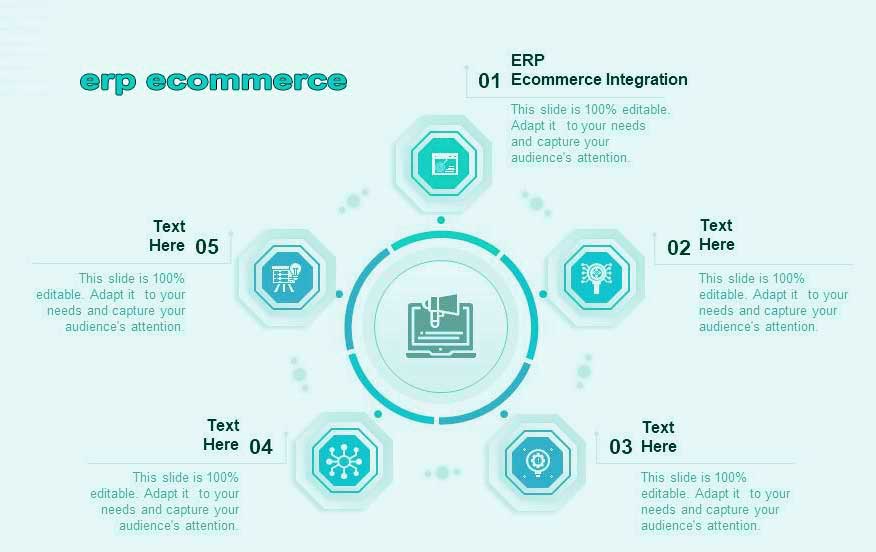Mastering Ecommerce Operations: The Role of ERP in Driving Efficiency
In the dynamic world of ecommerce, where the pace is fast and customer expectations are high, the integration of Enterprise Resource Planning (ERP) systems emerges as a strategic imperative. ERP in ecommerce is a transformative solution that streamlines operations, enhances visibility, and empowers businesses to meet the demands of a rapidly evolving digital marketplace. In this article, we delve into the symbiotic relationship between ERP and ecommerce, exploring the key functionalities, advantages, and the pivotal role it plays in driving efficiency and success in the ecommerce landscape.

Unveiling ERP in Ecommerce
1. Seamless Integration of Business Functions: At the core of ERP in ecommerce is the seamless integration of various business functions. From order processing and inventory management to customer relationship management (CRM) and financials, ERP ensures that all aspects of ecommerce operations work cohesively. This integration eliminates data silos, enhances collaboration, and provides a holistic view of the entire business process.
2. Real-Time Inventory Management: Ecommerce success hinges on effective inventory management. ERP systems enable real-time tracking of inventory levels, ensuring that businesses can optimize stock levels, prevent stockouts, and fulfill customer orders promptly. This real-time visibility is crucial for maintaining a competitive edge in the ecommerce space.
3. Streamlined Order Processing: Efficient order processing is a hallmark of ERP in ecommerce. The system automates order fulfillment, from order placement to shipping and delivery. Automation reduces the risk of errors, accelerates order processing times, and enhances the overall customer experience.
Key Functionalities of ERP in Ecommerce
4. Customer Relationship Management (CRM): Ecommerce relies heavily on customer relationships. ERP systems with CRM functionalities enable businesses to manage customer interactions, track customer preferences, and personalize the shopping experience. This fosters customer loyalty and drives repeat business.
5. Data Analytics for Informed Decision-Making: Data is a powerful asset in ecommerce. ERP systems provide advanced analytics tools that analyze customer behavior, sales trends, and website performance. These insights empower ecommerce businesses to make informed decisions, optimize marketing strategies, and stay ahead of market demands.
6. Multi-Channel Management: In the era of multichannel ecommerce, managing various sales channels seamlessly is a challenge. ERP systems facilitate multi-channel management, allowing businesses to coordinate sales across different platforms, whether it be online marketplaces, social media, or their own ecommerce website.
Advantages of ERP in Ecommerce
7. Enhanced Operational Efficiency: By automating routine tasks, integrating business functions, and providing real-time insights, ERP in ecommerce significantly enhances operational efficiency. Businesses can streamline processes, reduce manual efforts, and respond swiftly to market changes.
8. Improved Customer Experience: A seamless and efficient ecommerce operation translates to an improved customer experience. ERP systems contribute to quicker order processing, accurate inventory information, and personalized interactions, fostering customer satisfaction and loyalty.
9. Scalability for Growth: Ecommerce businesses often experience fluctuations in demand. ERP systems are designed to scale alongside business growth, accommodating increased data volumes, additional users, and expanding product catalogs without compromising performance.
Considerations When Implementing ERP in Ecommerce
10. Integration with Ecommerce Platforms: Effective implementation requires seamless integration with existing ecommerce platforms. Compatibility with popular ecommerce solutions ensures a smooth transition and minimizes disruptions during the adoption of ERP.
11. Data Security and Compliance: Ecommerce deals with sensitive customer data. Ensuring robust data security measures and compliance with industry regulations is paramount. ERP systems must prioritize data protection to maintain customer trust.
12. User Training: User training is crucial for successful ERP adoption. Ecommerce businesses should invest in training programs to ensure that employees can effectively navigate and utilize the functionalities of the ERP system.
The Future of ERP in Ecommerce
As ecommerce continues to evolve, the future of ERP in this space holds exciting possibilities. Anticipated trends include further integration with artificial intelligence, enhanced predictive analytics, and a focus on sustainability and environmental responsibility in ecommerce operations.
In Conclusion: Paving the Way for Ecommerce Excellence
In conclusion, ERP in ecommerce is a game-changer for businesses aiming to excel in the digital marketplace. Its ability to integrate functions, provide real-time insights, and enhance operational efficiency positions it as a strategic ally in the competitive world of ecommerce. As the ecommerce landscape continues to evolve, the adoption of ERP becomes not just a technological upgrade but a crucial step toward achieving excellence, fostering growth, and staying ahead in the dynamic and ever-expanding ecommerce arena.